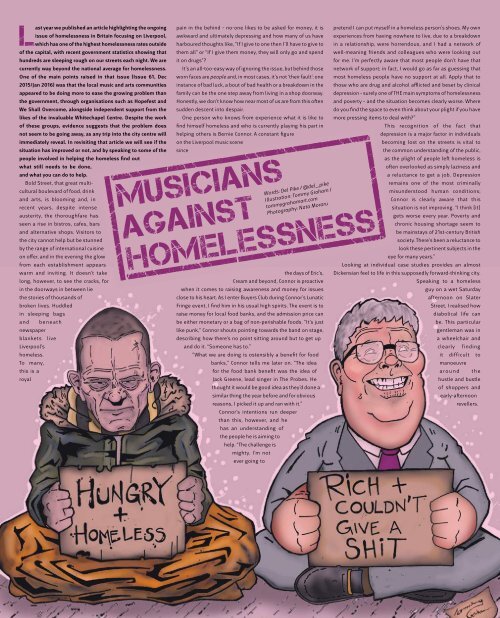Issue 72 / November 2016
November 2016 issue of Bido Lito! Featuring HOOTON TENNIS CLUB, ZUZU, FUSS, AMADOU & MARIAM, MUSICIANS AGAINST HOMELESSNESS, THE LAST WALTZ, DIFFERENT TRAINS, LIVERPOOL PSYCH FEST 2016 REVIEW and much more.
November 2016 issue of Bido Lito! Featuring HOOTON TENNIS CLUB, ZUZU, FUSS, AMADOU & MARIAM, MUSICIANS AGAINST HOMELESSNESS, THE LAST WALTZ, DIFFERENT TRAINS, LIVERPOOL PSYCH FEST 2016 REVIEW and much more.
You also want an ePaper? Increase the reach of your titles
YUMPU automatically turns print PDFs into web optimized ePapers that Google loves.
Last year we published an article highlighting the ongoing<br />
issue of homelessness in Britain focusing on Liverpool,<br />
which has one of the highest homelessness rates outside<br />
of the capital, with recent government statistics showing that<br />
hundreds are sleeping rough on our streets each night. We are<br />
currently way beyond the national average for homelessness.<br />
One of the main points raised in that issue (<strong>Issue</strong> 61, Dec<br />
2015/Jan <strong>2016</strong>) was that the local music and arts communities<br />
appeared to be doing more to ease the growing problem than<br />
the government, through organisations such as Hopefest and<br />
We Shall Overcome, alongside independent support from the<br />
likes of the invaluable Whitechapel Centre. Despite the work<br />
of these groups, evidence suggests that the problem does<br />
not seem to be going away, as any trip into the city centre will<br />
immediately reveal. In revisiting that article we will see if the<br />
situation has improved or not, and by speaking to some of the<br />
people involved in helping the homeless find out<br />
what still needs to be done,<br />
and what you can do to help.<br />
Bold Street, that great multicultural<br />
boulevard of food, drink<br />
and arts, is blooming and, in<br />
recent years, despite intense<br />
austerity, the thoroughfare has<br />
seen a rise in bistros, cafes, bars<br />
and alternative shops. Visitors to<br />
the city cannot help but be stunned<br />
by the range of international cuisine<br />
on offer, and in the evening the glow<br />
from each establishment appears<br />
warm and inviting. It doesn’t take<br />
long, however, to see the cracks, for<br />
in the doorways in between lie<br />
the stories of thousands of<br />
broken lives. Huddled<br />
in sleeping bags<br />
and<br />
newspaper<br />
beneath<br />
blankets live<br />
Liverpool’s<br />
homeless.<br />
To many,<br />
this is a<br />
royal<br />
pain in the behind – no-one likes to be asked for money, it is<br />
awkward and ultimately depressing and how many of us have<br />
harboured thoughts like, “If I give to one then I’ll have to give to<br />
them all” or “If I give them money, they will only go and spend<br />
it on drugs”?<br />
It’s an all-too-easy way of ignoring the issue, but behind those<br />
worn faces are people and, in most cases, it’s not ‘their fault’: one<br />
instance of bad luck, a bout of bad health or a breakdown in the<br />
family can be the one step away from living in a shop doorway.<br />
Honestly, we don’t know how near most of us are from this often<br />
sudden descent into despair.<br />
One person who knows from experience what it is like to<br />
find himself homeless and who is currently playing his part in<br />
helping others is Bernie Connor. A constant figure<br />
on the Liverpool music scene<br />
since<br />
the days of Eric’s,<br />
Cream and beyond, Connor is proactive<br />
when it comes to raising awareness and money for issues<br />
close to his heart. As I enter Buyers Club during Connor’s Lunatic<br />
Fringe event, I find him in his usual high spirits. The event is to<br />
raise money for local food banks, and the admission price can<br />
be either monetary or a bag of non-perishable foods. “It’s just<br />
like punk,” Connor shouts pointing towards the band on stage,<br />
describing how there’s no point sitting around but to get up<br />
and do it. “Someone has to.”<br />
“What we are doing is ostensibly a benefit for food<br />
banks,” Connor tells me later on. “The idea<br />
for the food bank benefit was the idea of<br />
Jack Greene, lead singer in The Probes. He<br />
thought it would be good idea as they’d done a<br />
similar thing the year before and for obvious<br />
reasons, I picked it up and ran with it.”<br />
Connor’s intentions run deeper<br />
than this, however, and he<br />
has an understanding of<br />
the people he is aiming to<br />
help. “The challenge is<br />
mighty. I’m not<br />
ever going to<br />
pretend I can put myself in a homeless person’s shoes. My own<br />
experiences from having nowhere to live, due to a breakdown<br />
in a relationship, were horrendous, and I had a network of<br />
well-meaning friends and colleagues who were looking out<br />
for me. I’m perfectly aware that most people don’t have that<br />
network of support; in fact, I would go as far as guessing that<br />
most homeless people have no support at all. Apply that to<br />
those who are drug and alcohol afflicted and beset by clinical<br />
depression – surely one of THE main symptoms of homelessness<br />
and poverty – and the situation becomes clearly worse. Where<br />
do you find the space to even think about your plight if you have<br />
more pressing items to deal with?”<br />
MUSICIANS<br />
AGAINST<br />
HOMELESSNESS<br />
Words: Del Pike / @del_pike<br />
Illustration: Tommy Graham /<br />
tommygrahamart.com<br />
Photography: Nata Moraru<br />
This recognition of the fact that<br />
depression is a major factor in individuals<br />
becoming lost on the streets is vital to<br />
the common understanding of the public,<br />
as the plight of people left homeless is<br />
often overlooked as simply laziness and<br />
a reluctance to get a job. Depression<br />
remains one of the most criminally<br />
misunderstood human conditions;<br />
Connor is clearly aware that this<br />
situation is not improving. “I think [it]<br />
gets worse every year. Poverty and<br />
chronic housing shortage seem to<br />
be mainstays of 21st-century British<br />
society. There’s been a reluctance to<br />
look these pertinent subjects in the<br />
eye for many years.”<br />
Looking at individual case studies provides an almost<br />
Dickensian feel to life in this supposedly forward-thinking city.<br />
Speaking to a homeless<br />
guy on a wet Saturday<br />
afternoon on Slater<br />
Street, I realised how<br />
diabolical life can<br />
be. This particular<br />
gentleman was in<br />
a wheelchair and<br />
clearly<br />
finding<br />
it difficult to<br />
manoeuvre<br />
around<br />
the<br />
hustle and bustle<br />
of shoppers and<br />
early-afternoon<br />
revellers.


















